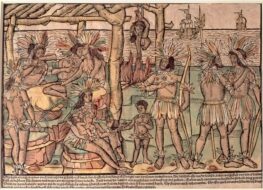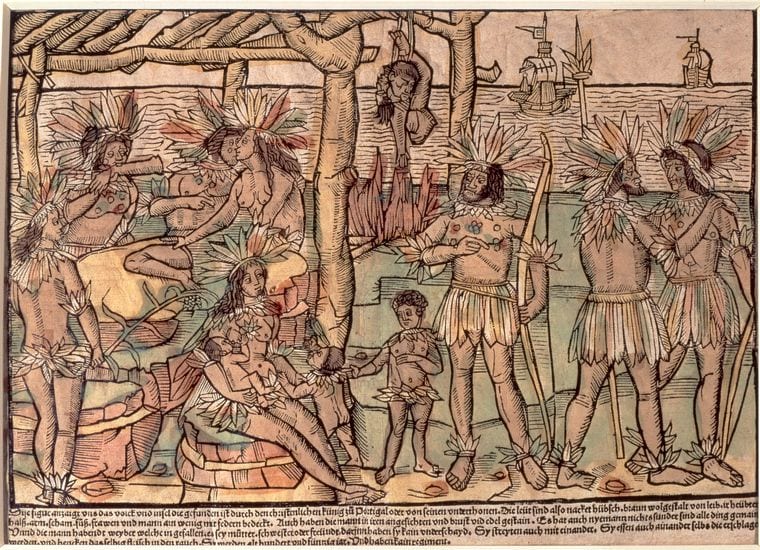

Conversation-based seminars for collegial PD, one-day and multi-day seminars, graduate credit seminars (MA degree), online and in-person.





No study questions
No related resources
How to treat the indigenous people became an issue as soon as the Spanish arrived in the Western Hemisphere. In a letter written soon after his first voyage, Christopher Columbus explained how he dealt with the natives and revealed his and Spain’s religious motive for exploring what he conceived to be, in explicitly religious terms (see Christopher Columbus to Doña Juana de Torres, 1500) a New World. In addition to the converts to Catholicism that Columbus mentions, the Spanish sought gold. What means were allowable in pursuit of these ends? By what authority did the Spanish make claims on the native people and their land? The Requerimiento provided the official answer to these questions.
Whatever Spanish justifications, the Spanish conquistadores or conquerors proved brutal and rapacious as the conquest continued. The authorities in Madrid did not approve. For example, laws regulating conduct in the conquest were promulgated in 1513 and 1542 (the latter partially repealed in 1545 because of opposition). They relieved Christopher Columbus of command over land he had discovered in part because of his brutality toward both Spanish settlers and the indigenous people. Columbus complained of the injustice of his removal (see Christopher Columbus to Doña Juana de Torres, 1500), by emphasizing that the New World was not like Spain but was an uncivilized lawless territory. Francisco de Vitoria, on the contrary, (see De Indis) sought to mitigate the harshness of the conquest by arguing that law – civil, natural and divine – should prevail everywhere. He argued for limits on what could legitimately be done to the indigenous people. In doing so, he helped develop just war theory. Despite de Vitoria’s arguments, distance from Madrid, limited means of communication, and the need for colonial wealth reduced the ability and willingness of Spain’s monarchs to control what was done in their name thousands of miles away from their palaces. Bartolomé de las Casas (A Short Description of the Destruction of the Indies, 1542) describes the consequences of the Spanish conquest.
On the part of the King, Don Fernando, and of Doña Juana, his daughter, Queen of Castile and León, subduers of the barbarous nations, we their servants notify and make known to you, as best we can, that the Lord our God, Living and Eternal, created the Heaven and the Earth, and one man and one woman, of whom you and we, all the men of the world, were and are descendants, and all those who came after us. But, on account of the multitude which has sprung from this man and woman in the five thousand years since the world was created, it was necessary that some men should go one way and some another, and that they should be divided into many kingdoms and provinces, for in one alone they could not be sustained.
Of all these nations God our Lord gave charge to one man, called St. Peter, that he should be Lord and Superior of all the men in the world, that all should obey him, and that he should be the head of the whole human race, wherever men should live, and under whatever law, sect, or belief they should be; and he gave him the world for his kingdom and jurisdiction.
And he commanded him to place his seat in Rome as the spot most fitting to rule the world from; but also he permitted him to have his seat in any other part of the world, and to judge and govern all Christians, Moors [Muslims], Jews, Gentiles, and all other sects. This man was called Pope, as if to say, Admirable Great Father and Governor of men. The men who lived in that time obeyed that St. Peter and took him for Lord, King, and Superior of the universe; so also they have regarded the others who after him have been elected to the pontificate, and so has it been continued even till now and will continue till the end of the world.
One of these Pontiffs [popes] who succeeded that St. Peter as Lord of the world, in the dignity and seat which I have before mentioned, made donation of these isles and Tierra-firme to the aforesaid King and Queen and to their successors,1 our lords, with all that there are in these territories, as is contained in certain writings which passed upon the subject as aforesaid, which you can see if you wish.
So their Highnesses are kings and lords of these islands and land of Tierra-firme by virtue of this donation: and some islands, and indeed almost all those to whom this has been notified, have received and served their Highnesses, as lords and kings, in the way that subjects ought to do, with good will, without any resistance, immediately, without delay, when they were informed of the aforesaid facts. And also they received and obeyed the priests whom their Highnesses sent to preach to them and to teach them our Holy Faith; and all these, of their own free will, without any reward or condition, have become Christians, and are so, and their Highnesses have joyfully and benignantly received them, and also have commanded them to be treated as their subjects and vassals; and you too are held and obliged to do the same. Wherefore, as best we can, we ask and require you that you consider what we have said to you, and that you take the time that shall be necessary to understand and deliberate upon it, and that you acknowledge the Church as the Ruler and Superior of the whole world, and the high priest called Pope, and in his name the King and Queen Doña Juana our lords, in his place, as superiors and lords and kings of these islands and this Tierra-firme by virtue of the said donation, and that you consent and give place that these religious fathers should declare and preach to you the aforesaid.
If you do so, you will do well, and that which you are obliged to do to their Highnesses, and we in their name shall receive you in all love and charity, and shall leave you, your wives, and your children, and your lands, free without servitude, that you may do with them and with yourselves freely that which you like and think best, and they shall not compel you to turn Christians, unless you yourselves, when informed of the truth, should wish to be converted to our Holy Catholic Faith, as almost all the inhabitants of the rest of the islands have done. And, besides this, their Highnesses award you many privileges and exemptions and will grant you many benefits.
But, if you do not do this, and maliciously make delay in it, I certify to you that, with the help of God, we shall powerfully enter into your country, and shall make war against you in all ways and manners that we can, and shall subject you to the yoke and obedience of the Church and of their Highnesses; we shall take you and your wives and your children, and shall make slaves of them, and as such shall sell and dispose of them as their Highnesses may command; and we shall take away your goods, and shall do you all the mischief and damage that we can, as to vassals who do not obey, and refuse to receive their lord, and resist and contradict him; and we protest that the deaths and losses which shall accrue from this are your fault, and not that of their Highnesses, or ours, nor of these cavaliers who come with us. And that we have said this to you and made this Requisition, we request the notary here present to give us his testimony in writing, and we ask the rest who are present that they should be witnesses of this Requisition.

Conversation-based seminars for collegial PD, one-day and multi-day seminars, graduate credit seminars (MA degree), online and in-person.